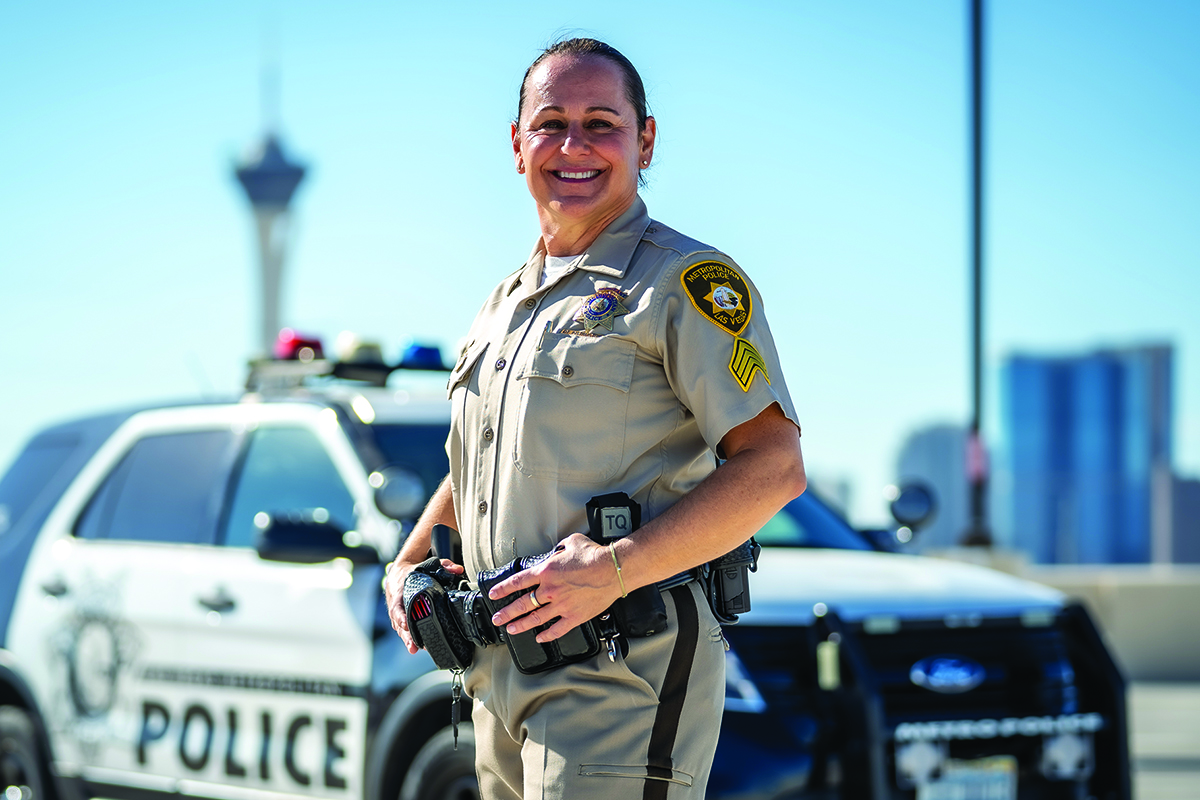Beth Schmidt

Abandoning a two-decade career as an award-winning journalist to become a Las Vegas police officer at 45 isn’t your typical career arc. But it’s all part of the story for Beth Schmidt.
The seemingly disparate professions actually have more in common than most think. “As a cop, you’re trying to figure out the unbiased story, what really happened,” Schmidt says. “You show up at a scene and you have a victim and you have a suspect, and their stories are incredibly different. We may not have the value of a video or witnesses. It’s very much the same skill set of journalism and how to talk to people.” But there’s an added perk: “I get to drive cars fast.”
Schmidt, who has had an affinity for the military since she was young, considered enrolling at West Point but was swayed against the idea by her family, whose members include “Ph.D.s, writers and liberal arts folks,” she says. Instead, she went to Williams College, then on to journalism stints at Sports Illustrated, ABC Sports and the BBC. Schmidt eventually decided to write books, and in 2010 she published a well-reviewed young adult novel, Soccerland, about a soccer-loving teen. She says that she considered turning the story into a series but that writing books was too “lonely.” And she was looking for a new challenge.
Schmidt moved west and applied for an editing job with the Las Vegas Metropolitan Police Department. But her recruiter saw something more in her, suggesting she consider wearing the badge. Schmidt figured she was too old, but there are no age restrictions to become a police officer in Las Vegas. “They value people with prior experience, and all of a sudden those things that attracted me to West Point started to come back,” Schmidt says. “I realized people would look at me like I was crazy and that it was a huge jump, but it wasn’t. I literally took the skillset that I built over 20 years of learning to talk to people.”
Schmidt has climbed the ranks during her 13 years with the force; she’s now a sergeant in the department’s financial crimes section. It’s a plainclothes job in which officers investigate “forgery labs,” where fraudulent credit cards, money and checks are manufactured. In law enforcement, financial crimes are burgeoning, reflecting new trends in criminal activity. “A lot of the really dangerous criminals are moving away from selling drugs, human trafficking and running prostitutes,” Schmidt says.
In a department where just 10 % of sworn officers are women, Schmidt sees herself as a role model. She was recognized earlier in her career for helping to reduce crime in the Downtown Area Command, where she led community-oriented policing efforts. Schmidt also worked as a patrol officer, taught officers about the use of force and was a detective in internal affairs. In January, she will be promoted to director and will lobby and oversee the department’s intergovernmental services section.
Schmidt’s family has been supportive of her life in law enforcement from the beginning. When her mother was 80, she even went for a ride-along.
Police work has deepened Schmidt’s compassion for the less fortunate, an outlook that was shaped by her humanities grounding at Exeter and Williams. “I didn’t grow up with money, but I grew up with every opportunity in the world,” she says. “What I came away with from that is: I’m not special, and neither are you. Nobody wants to live in a dangerous neighborhood; nobody wants to feel unsafe.
“When we grow up with privilege, it’s incumbent upon us to change the world we live in.”
— Andy Faught
Editor’s Note: This article first appeared in the fall 2022 issue of The Exeter Bulletin.


